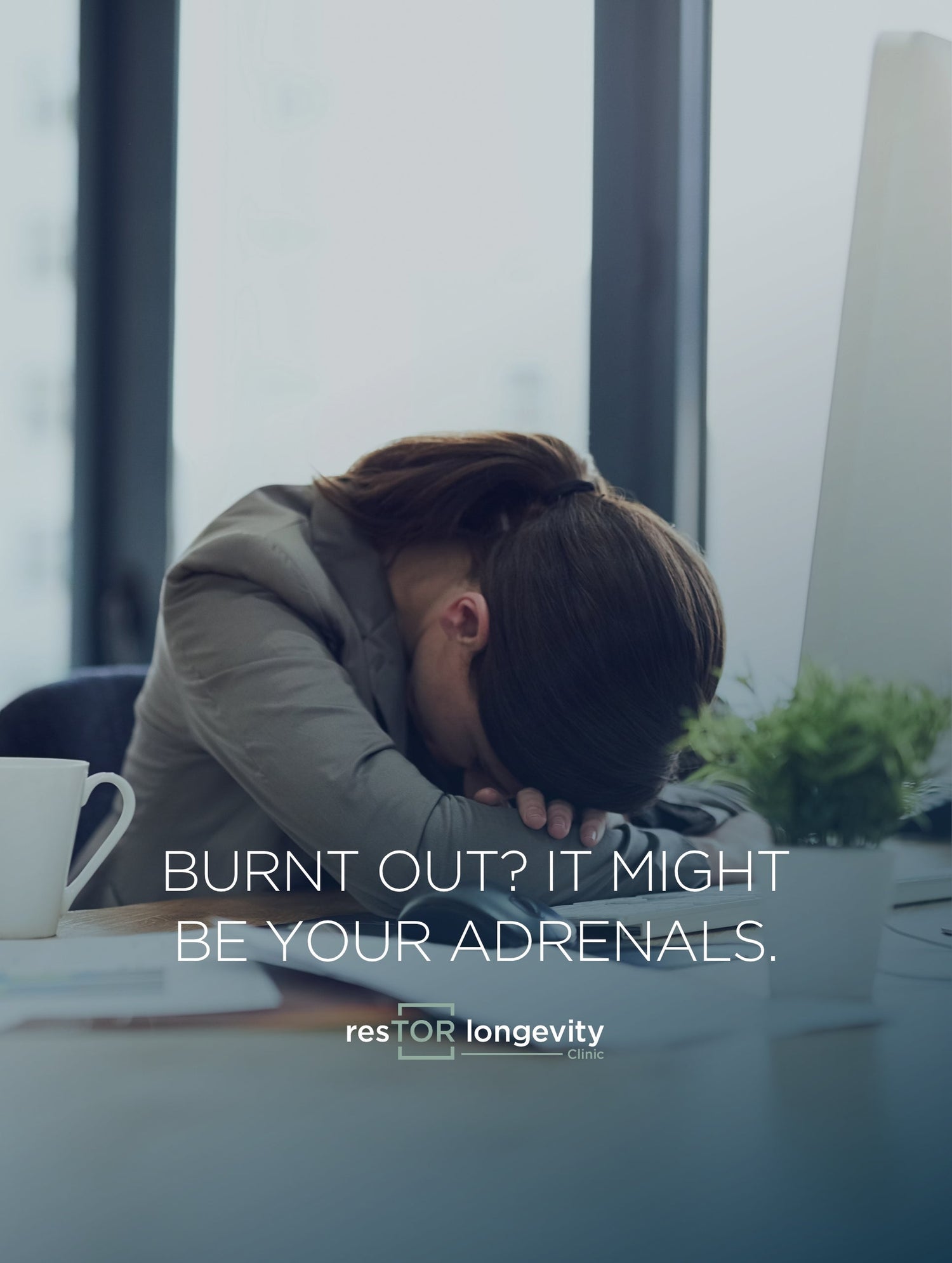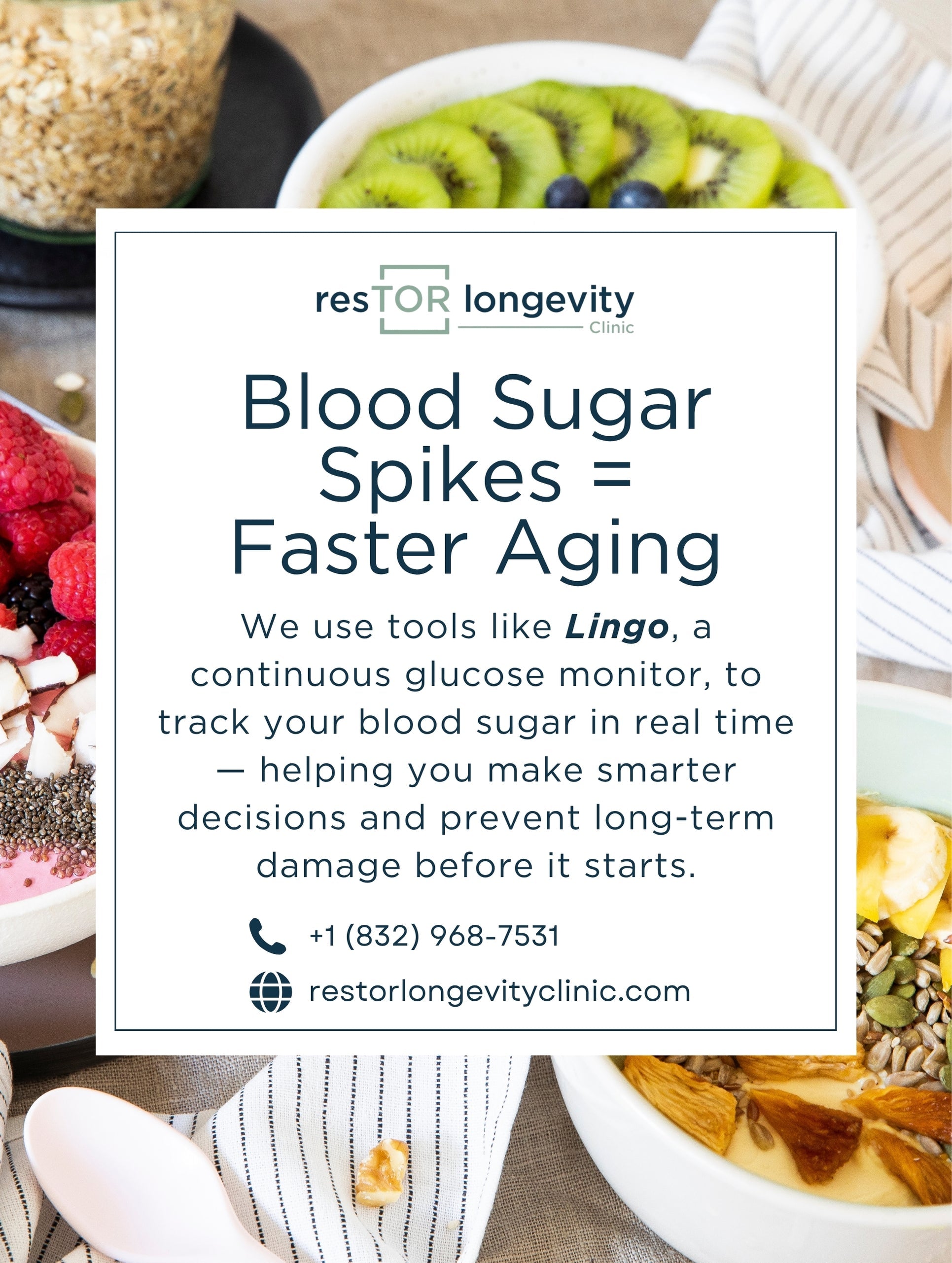Burnt Out? It Might Be Your Adrenals
We all experience stress. But when stress becomes constant—mental, physical, or emotional—your body can start sending signals that something deeper is off.
If you feel tired no matter how much you sleep, rely on caffeine to get through the day, or crash every afternoon, it might not just be your schedule.
It could be your adrenals.
At resTOR Longevity Clinic, we see adrenal dysfunction all the time in high-achieving professionals, busy parents, and anyone pushing through prolonged periods of stress without enough recovery. Often misdiagnosed or dismissed, adrenal issues can play a major role in how you feel—and how you age.
What Are the Adrenal Glands?
Your adrenal glands are two small, triangular glands located on top of your kidneys. Don’t let their size fool you—they have a big job.
They produce key stress and metabolic hormones, including:
-
Cortisol – helps regulate stress response, inflammation, blood sugar, and energy
-
DHEA – supports mood, metabolism, and hormone balance
-
Adrenaline (epinephrine) – triggers the fight-or-flight response
-
Aldosterone – regulates blood pressure and fluid balance
When working well, your adrenals help you respond to stress, stay energized, sleep soundly, and maintain resilience.
But when they're overworked for too long? That’s when symptoms start to show up.
What Is Adrenal Dysfunction (aka “Adrenal Fatigue”)?
Though not always recognized in conventional medicine, adrenal dysfunction is a term used to describe the body’s impaired ability to handle stress due to dysregulated cortisol production.
Think of it as the wear-and-tear effect of long-term pressure. Your adrenals either produce too much cortisol (in early stages) or too little (as they begin to burn out). This results in an unpredictable stress response and a cascade of hormonal imbalances.
While “adrenal fatigue” isn’t a formally accepted medical diagnosis, the symptoms are very real—and very common.
Signs Your Adrenals May Be Struggling
If your adrenals are under strain, you might experience:
-
Constant fatigue, even after a full night’s sleep
-
Brain fog and poor concentration
-
Mood swings and irritability
-
Anxiety or feeling wired but tired
-
Sleep disturbances, especially waking around 2–4 AM
-
Low libido and hormonal imbalance
-
Salt or sugar cravings
-
Reliance on caffeine to function
-
Afternoon crashes
-
Weakened immune function (frequent colds or illness)
Over time, adrenal dysfunction can also impact thyroid function, metabolism, and aging—making it essential to address.
What Causes Adrenal Dysfunction?
Several modern-day stressors can contribute to adrenal burnout, including:
-
Chronic emotional or psychological stress
-
Overtraining or lack of recovery
-
Poor sleep or sleep apnea
-
Blood sugar imbalances
-
Nutrient deficiencies (especially B vitamins, magnesium, and vitamin C)
-
Stimulant overuse (like caffeine or energy drinks)
-
Infections, inflammation, or chronic illness
-
Environmental toxins
At resTOR, we take a comprehensive view—because adrenal health isn’t isolated. It’s deeply connected to your nervous system, hormones, gut, and lifestyle.
How We Test for Adrenal Health at resTOR
Standard lab work often misses subtle adrenal imbalances. That’s why we use functional hormone testing—including saliva or urine-based cortisol panels—to track:
-
Cortisol patterns throughout the day
-
DHEA levels
-
Cortisol-to-DHEA ratios
-
Hormone rhythm and resilience
We also assess other systems that affect adrenal load—like gut health, sleep, inflammation, and detox capacity.
How to Support Your Adrenals and Recover from Burnout
Healing adrenal dysfunction requires more than just “resting.” It’s about creating a sustainable foundation for resilience.
Here’s where we often start:
1. Balance Blood Sugar
Eat protein, fiber, and healthy fats at each meal to avoid cortisol-spiking crashes. Ditch the sugar and refined carbs that create hormonal swings.
2. Prioritize Sleep
Adrenal repair happens during deep, consistent sleep. Aim for 7–9 hours, and keep a regular bedtime. Reduce blue light exposure at night.
3. Scale Back High-Intensity Exercise
Temporarily swap HIIT or long cardio sessions for gentle movement like walking, yoga, or mobility work.
4. Supplement Strategically
Depending on your test results, we may recommend adaptogenic herbs (like ashwagandha or rhodiola), B vitamins, magnesium, or vitamin C to restore adrenal function.
5. Support Nervous System Regulation
Daily breathwork, meditation, or vagus nerve stimulation can shift your body from fight-or-flight into healing mode.
The Bottom Line
If you're constantly tired, emotionally drained, or just not feeling like yourself—even with rest—your adrenals may be calling for help.
At resTOR Longevity Clinic, we specialize in getting to the root of fatigue and burnout. Through advanced hormone testing and personalized recovery plans, we help you rebuild energy, restore hormone balance, and feel like yourself again.
Don’t settle for “just getting by.” Let’s uncover what’s really draining you—and build your body back up for long-term vitality.
Schedule a consultation today and take the first step toward adrenal recovery and resilience.



